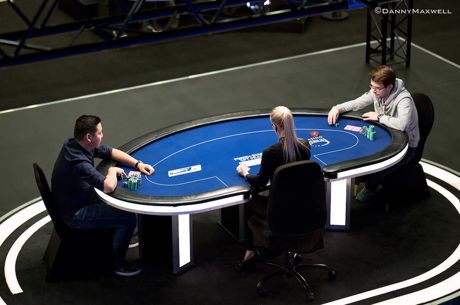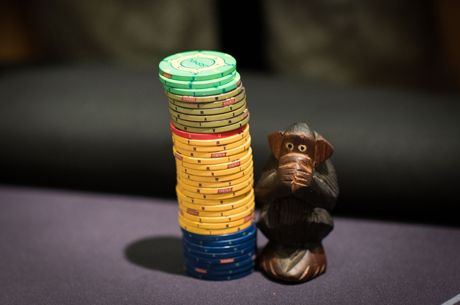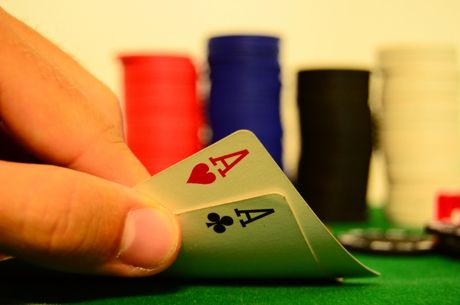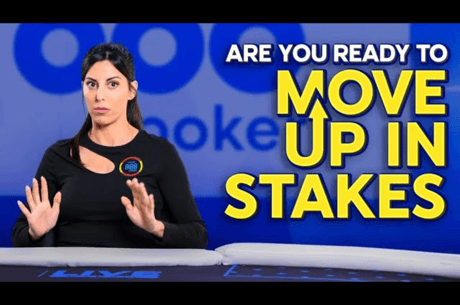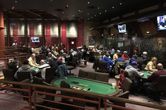Hand Review: Would You Fold a Set Deep in This Tournament?
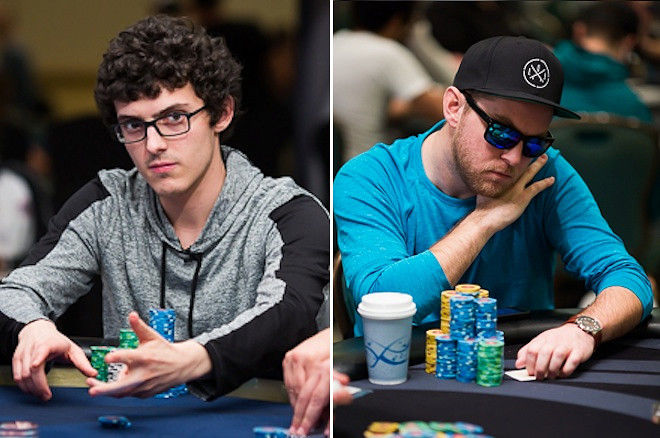
Covering live poker tournaments for a living affords me the opportunity to see countless thousands of hands played out, many of which offer interesting and potentially valuable insights into how players �� both amateurs and professionals �� play the game. In this ongoing series, I'll highlight hands I've seen at the tournaments I've covered and see if we can glean anything useful from them.
The Scene
It's late in the PokerStars Championship Bahamas $5,000 Main Event, with the end of Day 4 in sight and just 17 players still in the hunt for the first-place prize of $480,012. With eight-handed tables, that meant everyone was playing short-handed for the moment.
With blinds and antes at Level 23 (12,000/24,000/4,000), a big hand came up on one of the outer tables that saw one player take a massive chip lead in the tournament, and we'll take a look at it here. The players involved were about 1.7 million deep effectively.
The Action
Michael Bartholomew (pictured above on the right) was in early position and opened to 52,000. Michael Gentili (above, left) called on his immediate left, and one other player in late position came along to see a flop come 10?7?9?.
Bartholomew gave up the lead and checked, then called a bet of 110,000 from Gentili after the third player folded. On the Q? turn the action went similarly with Bartholomew check-calling a bet of 250,000. The river brought the 2? and another check from Bartholomew, and this time Gentili bet 400,000.
"Set over set?" Bartholomew asked as he went deep into the tank. "You think I'm capped at one pair so you can get me off," he added while continuing to think.
Eventually someone called the clock, and Bartholomew decided to call. Gentili quickly showed he had 10?10? in the hole for top set on the flop, and Bartholomew mucked his 7?7?.
Concept and Analysis
Both players in this hand pick up solid pairs that they certainly need to play at a short-handed table.
Gentili has the stronger hand and the better position, but three-betting tens in this spot could lead to getting four-bet, especially when the opener is in early position, so it's usually better to just call against most opponents. The players are plenty deep, so even against very tight players, Gentili would have the odds he needs to see a flop.
Bartholomew makes the decision to check on the 10?7?9? flop despite seeing basically an ideal flop for his hand. On a flop that coordinated, it's likely someone else hit it in a three-way pot, especially with both players having flatted his opening raise, so while betting would be the natural choice, checking has some merit as well. He's not as likely to miss value or give up a free card.
Gentili bets, and Bartholomew decides to play it slow. If the turn is a jack, eight or six, there will be a four-straight on board and Bartholomew will be out of position and guessing, so he opts to play some pot control and stay disguised.
The Q? turn brings in another possible straight, but Bartholomew decides to stick with his plan and continue check-calling. He keeps Gentili's bluffs, semi-bluffs and weaker value hands in the pot here while continuing to under-represent his holding.
On the river, Bartholomew faces a final, sizable bet that seems to make him consider a hero fold.
In this spot, what hands could Gentili be betting? Without knowing how loose or tight Gentili was playing, we can speculate a little bit.
He's not likely to go for three streets of value with just a pair of tens. If he had a ten with a straight draw and/or turned flush draw, like 10?8?, it would make sense to bet twice then check back the river and try to win a showdown.
Gentili could have something like QxJx or a stronger hand like 10x9x or Qx10x and be betting for value. He could also have a missed semi-bluff like 9?8? and be trying to force Bartholomew to fold a one-pair hand or something like AxJx.
Could Gentili have a straight?
That doesn't seem terribly likely, although he might bet the flop with KxJx as a decent spot to semi-bluff. Other straights �� Jx8x and 8x6x �� just seem too loose to call with preflop when someone opens in early position.
In the end, Bartholomew can't get away, and he probably shouldn't. There's no real reason for Gentili to think any two-pair hand he might hold isn't the best hand, and since Bartholomew hasn't shown any real strength in the hand aside from an early-position opening raise, he has no way of knowing Bartholomew has a hand that probably can't be bluffed.
There are just too many hands Bartholomew beats, and while he was unlucky to flop a set and be beaten, he was fortunate he chose a line that lost him the minimum.

